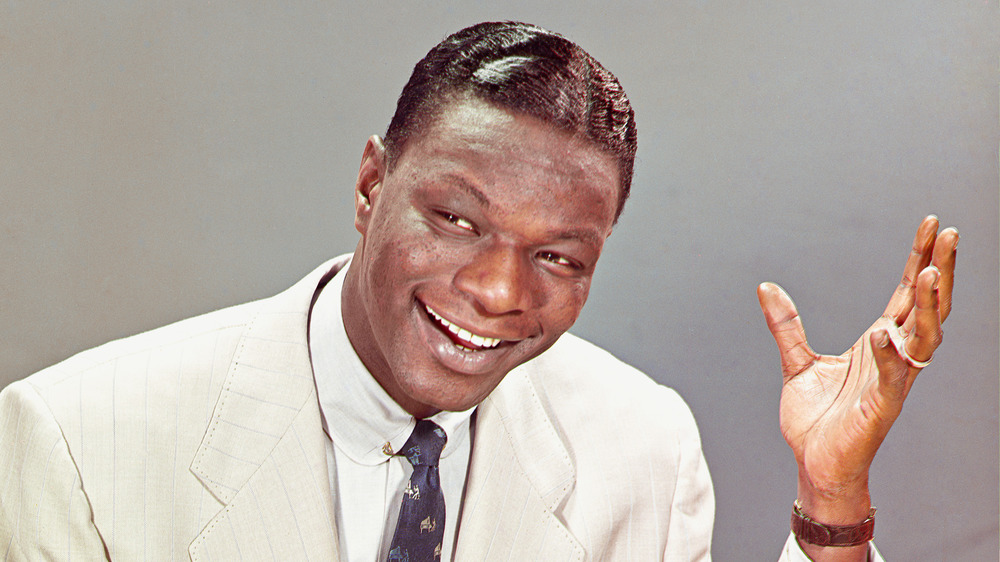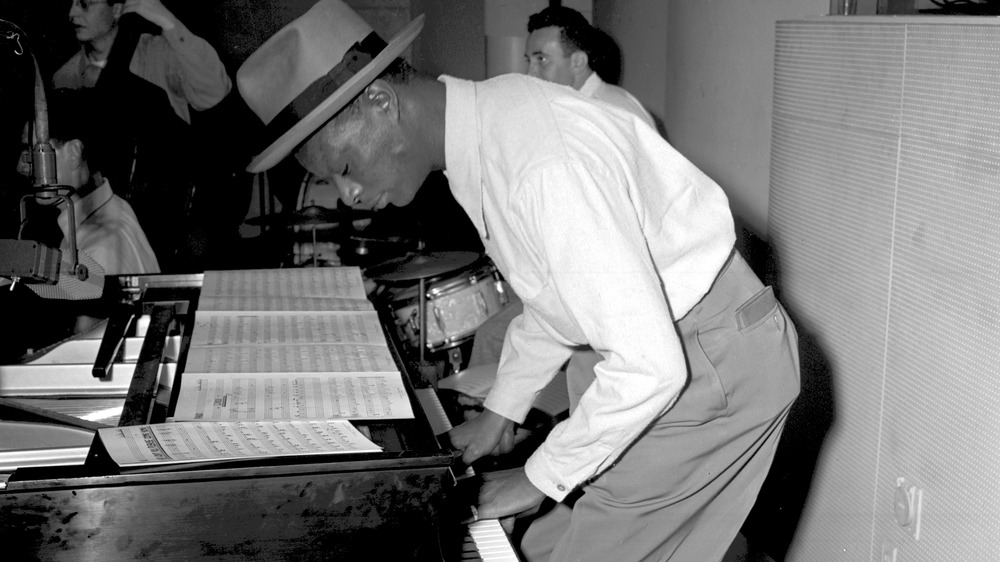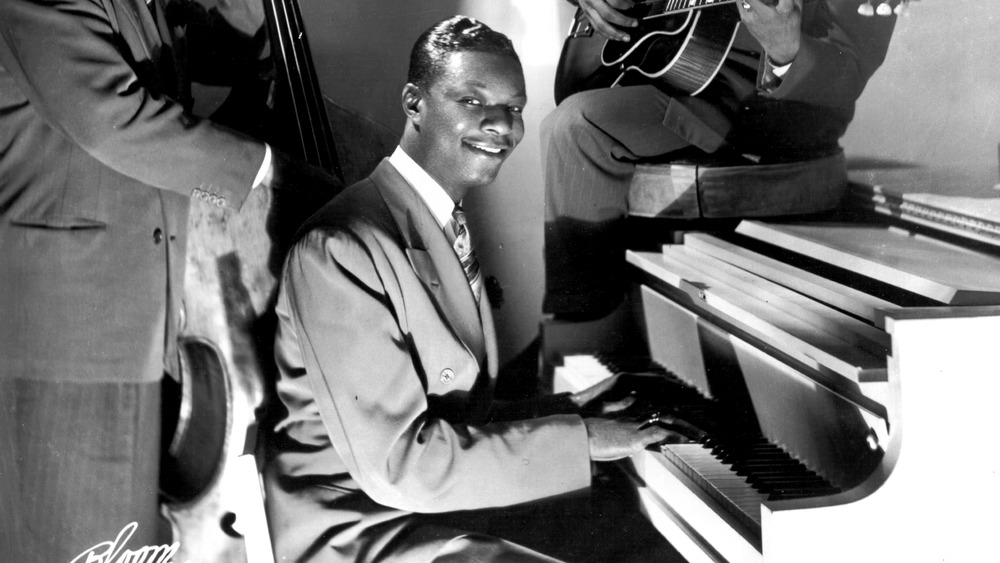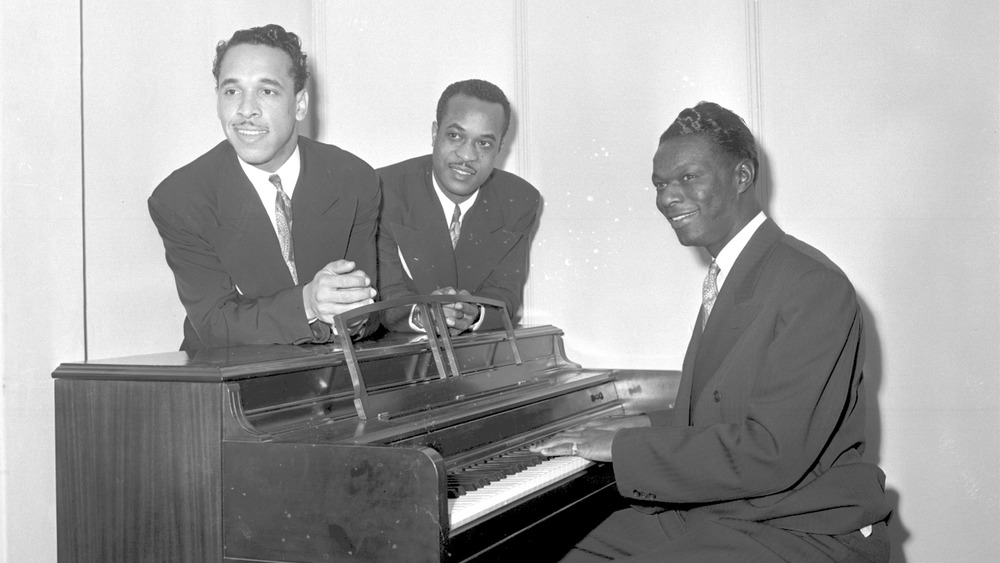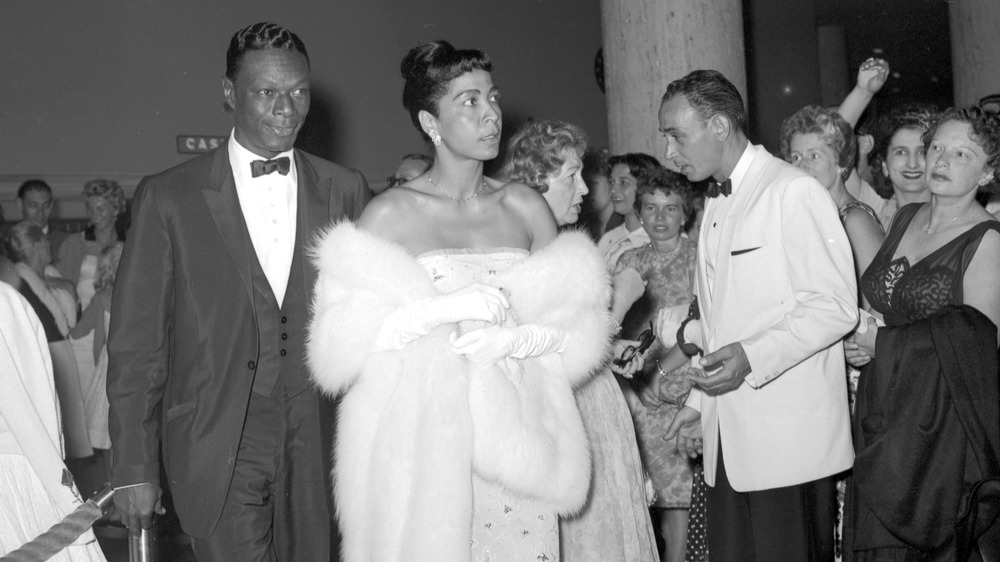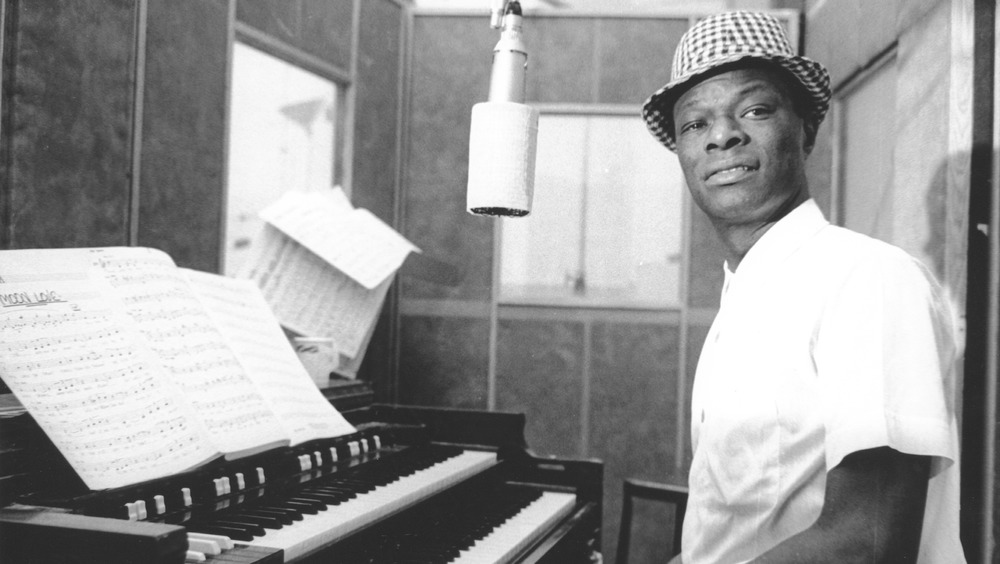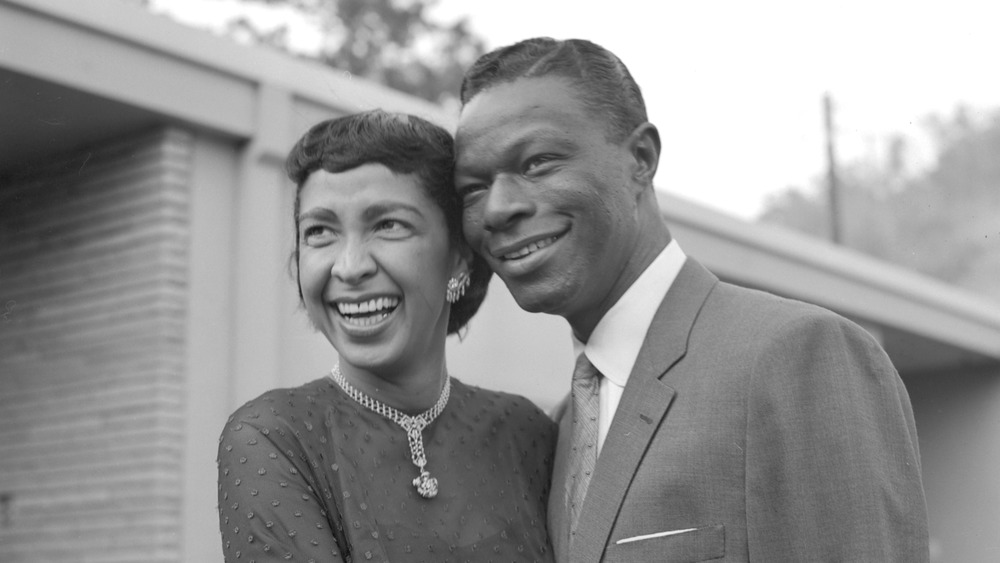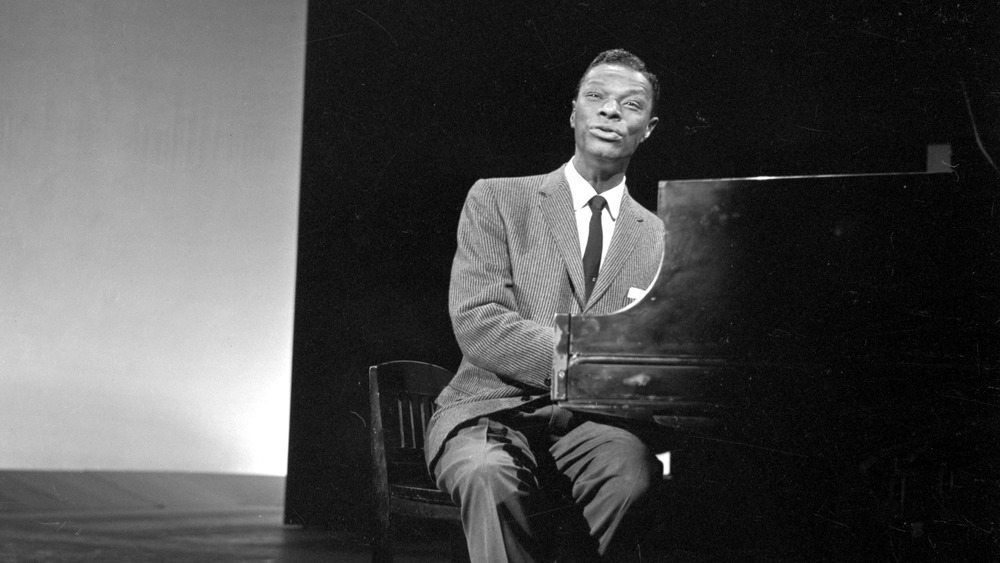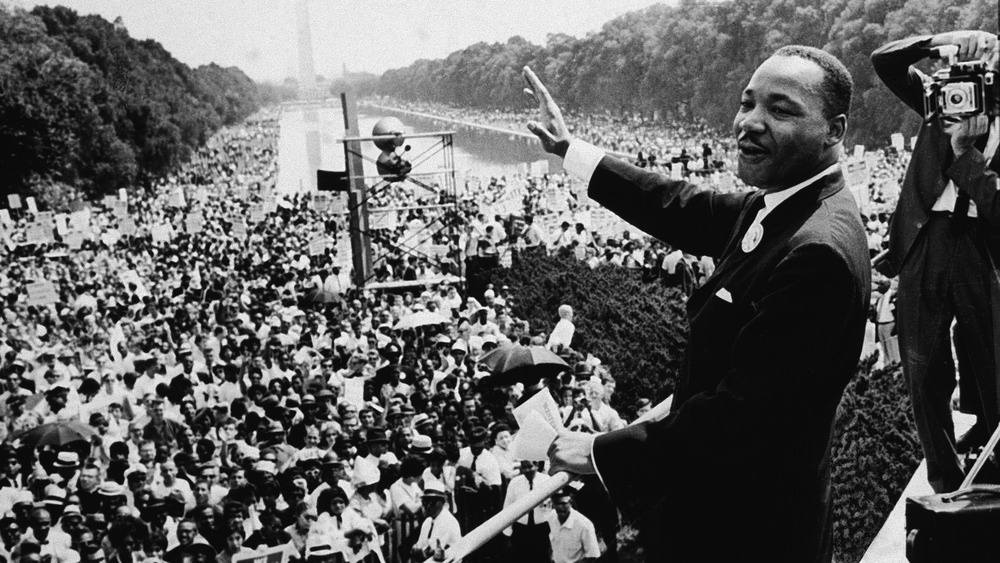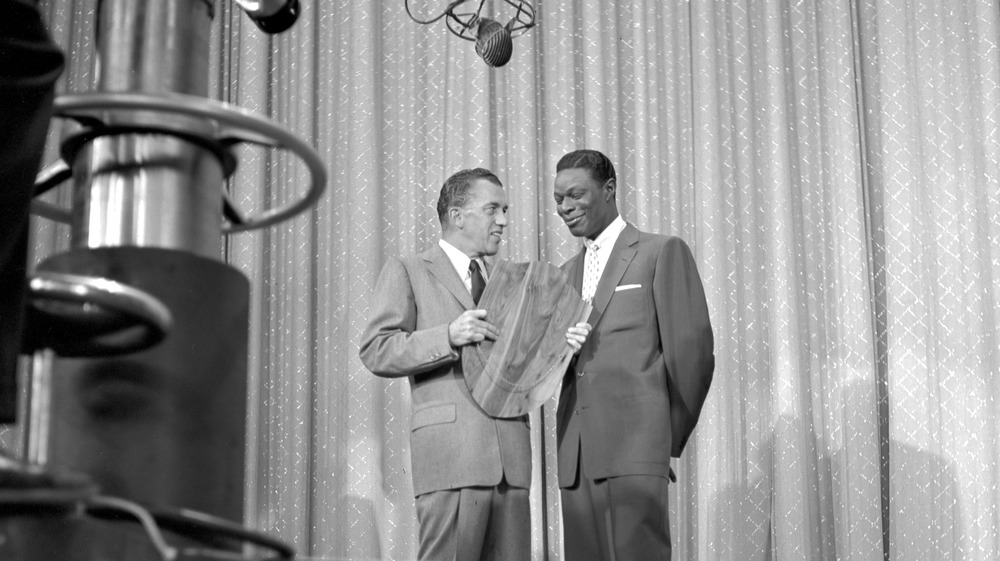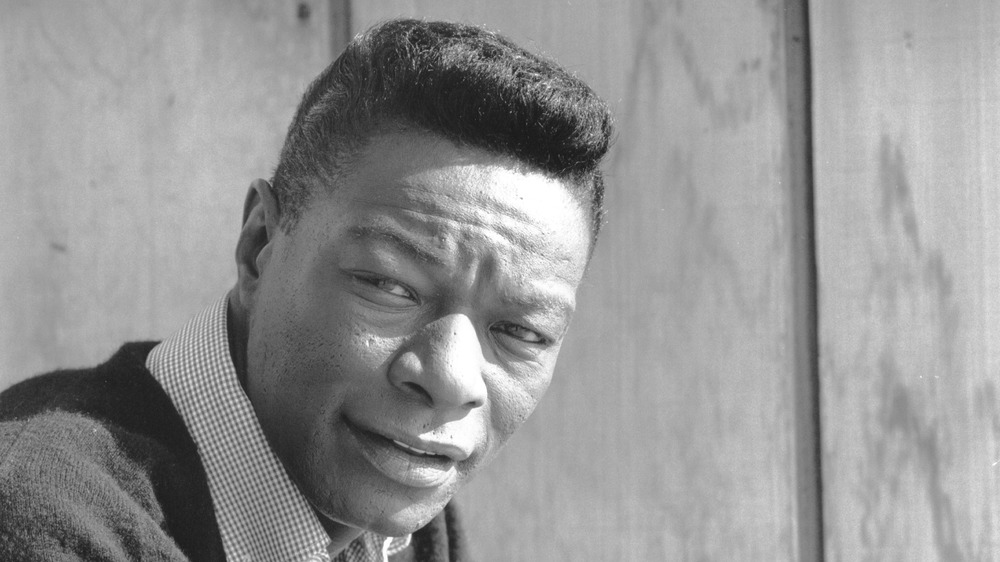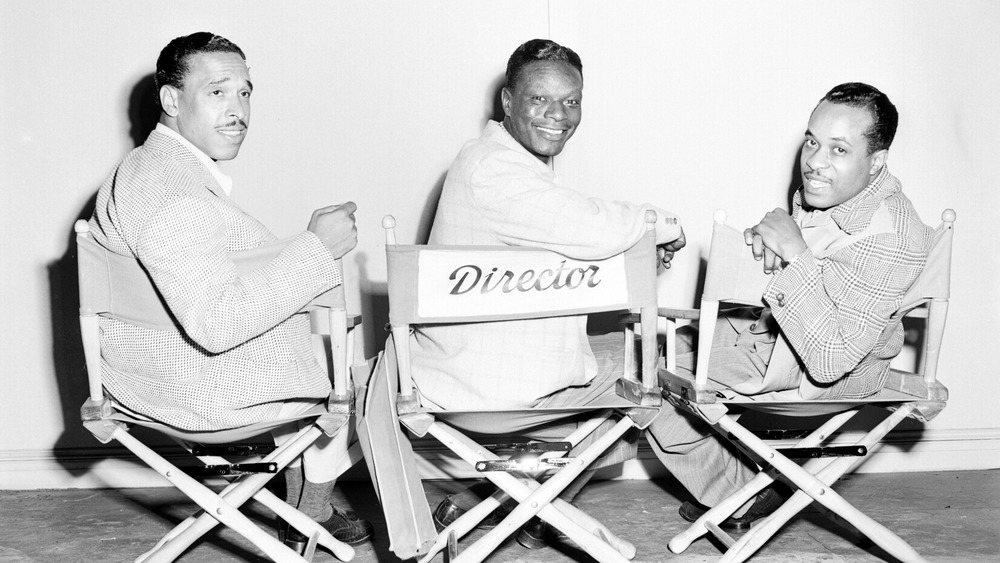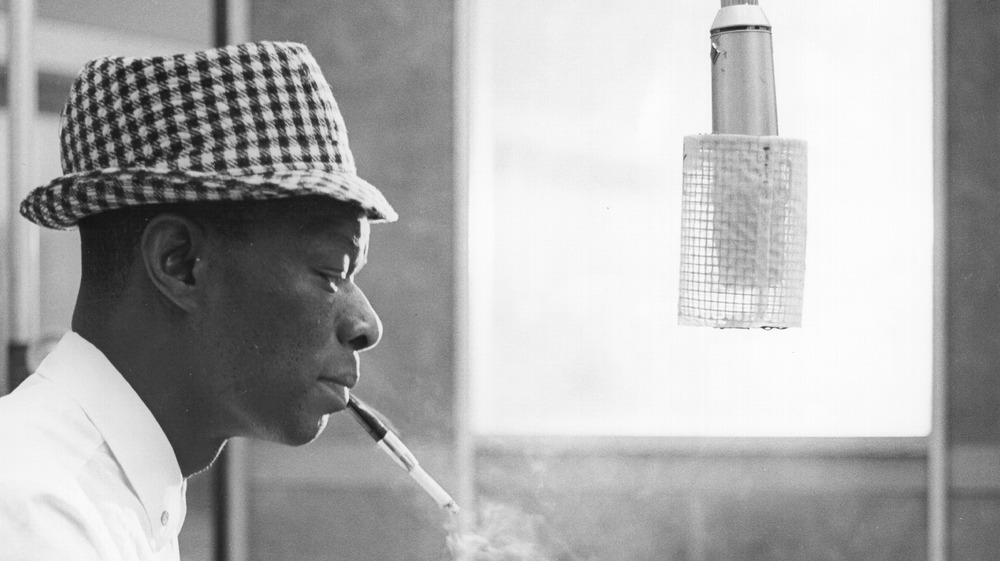The Untold Truth Of Nat King Cole
One of the greatest vocalists of the 20th century, Nat King Cole has given the world countless classics, from timeless love songs like "Unforgettable" and "L-O-V-E" to the holiday standard "The Christmas Song." According to NPR, he sold over 50 million records and had hit after hit during his career, including more than 30 entries on the Billboard Hot 100 (via Billboard). An African-American jazz pianist, pop vocalist, and balladeer, Cole's popularity is even more incredible considering the time period in which he thrived. Subjected to all the barriers of the Jim Crow era, Cole's unprecedented success helped advance Black Americans' role in media, and while he never considered himself an activist, he would directly challenge segregation and contribute to the Civil Rights Movement.
Gone too soon at only 45 years old, Cole still managed to leave a lasting impact on music, culture, and history. He was, without a doubt, a pioneer, but that doesn't mean his many successes came without struggles. Here's a look into the untold truth of Nat King Cole.
Nat King Cole started out as a classical piano prodigy
Born in Alabama on March 17, 1919, Nathaniel Adams Coles (he would later drop the "s") always had a musical streak. As told by Marianne Ruuth in her book Nat King Cole, he grew up in Chicago deeply entrenched in religious music, with a gospel choir leader for a mother and a reverend for a father. His mom, an amateur piano player herself, gave him piano lessons when he was as young as four years old, with "Yes, We Have No Bananas" being the first song he ever learned to play. According to UDiscover Music, Cole also had perfect pitch, making him able to pick out and identify a note on the piano in an instant.
As a kid, Cole played the organ and sang at church with his family. At the same time, though, he was highly influenced by his brother Eddie, who was six years older and a big fan of the popular jazz music that their father criticized. A multi-talented musician who played piano, bass, and tuba, Eddie would sneak out in the night to perform at various gigs around town, and it wasn't too long before young Nat started following him around, too. Eddie strongly encouraged Nat to learn how to read music and become proficient in the technical side of piano playing. Nat took the advice seriously and, around the age of 12, started to dive into the classics, "playing everything from Bach to Rachmaninoff," according to Ruuth.
Nat King Cole dropped out of school to be a jazz pianist
From the start, Nat King Cole's mother supported his musical ambitions. Marianne Ruuth writes how it was his mom who convinced his father to allow him to look for work as a jazz pianist on weeknights, so long as he continued playing for the church. Apparently, his part-time efforts paid off, because by the time he was 15, he had dropped out of school and was pursuing music full-time. Luckily, the young Cole had his older brother Eddie to guide him. According to AllMusic, the two joined forces after Eddie returned from touring with Noble Sissle's band and formed their own swing sextet. It was with this band — named after and led by Eddie — that Nat King Cole made his first recording: "Eddie Cole's Swingsters" recorded two singles for Decca Records in 1936.
The brothers were also hired to perform in the "revival of the all-black Broadway musical revue Shuffle Along" for their Chicago stop. Nat would continue playing piano with the revue for the rest of the tour, performing all across the country until the show, unfortunately, ran out of money in Long Beach in 1937, as described by the Orlando Sentinel.
Singing wasn't part of Nat King Cole's original plan
Despite the fact that Nat King Cole is revered today as a vocal legend, he never intentionally pursued a singing career. According to the Orlando Sentinel, after his time with Shuffle Along came to an end in Long Beach, Cole and his wife at the time decided to settle in California. He had always looked for work as a pianist and "played piano at almost every beer joint from San Diego to Bakersfield" before he finally landed a residency. Cole was hired as the pianist for a jazz quartet that would play at the Swanee Inn near Hollywood, as told by uDiscover Music. When the drummer never showed up, the quartet became a trio. With Cole on the piano, Oscar Moore on the guitar, and Wesley Prince on string bass, the three became known as the famous King Cole Trio.
Legend has it that, one night, a drunk customer demanded that the group sing. Initially, Cole refused, replying, "We don't sing." But after some prodding from the manager who insisted since the customer was a "big spender," Cole agreed. His rendition of "Sweet Lorraine" was so well-received that he continued to sing, and his pure musical talent, both vocally and on the piano, began to get the attention it deserved.
Nat King Cole remarried only six days after his divorce
With a catalog full of memorable love songs, Nat King Cole certainly had his own interesting experiences with romance. As a teenager, Cole became caught up in a relationship with a woman ten years older than him, according to Observer. The year was 1936, and Cole had left his hometown of Chicago to go on tour with a Broadway musical revue. He and one of the dancers, Nadine Robinson, hit it off, and by 1937, the two were married in Michigan, as told by AllMusic. Cole was only 17.
Not much is publicly known about this first marriage, which came to an end about 11 years later in 1948. Instead, his most publicized relationship was his marriage to Maria Hawkins Ellington. Stemming from an upper-class family, Ellington was a jazz singer who performed with notable names like Count Basie and Duke Ellington (no relation), according to The Hollywood Reporter. The couple's lavish Harlem wedding took place only six days after Cole and Robinson's divorce was finalized. While there were some difficulties regarding the whole event — the Waldorf Astoria refused to host the wedding because they were Black, and Ellington's aunt (who'd raised her) boycotted the wedding because of Cole's lower-class status — the marriage would last until Cole's death in 1965 (via Harlem World Magazine).
Nat King Cole recorded four versions of The Christmas Song
It's rare for songs to withstand the test of time and become classics. Arguably, it's even rarer for one to become a "holiday standard," played by the masses year after year. Nat King Cole has a catalog full of both. The classic "The Christmas Song (Chestnuts Roasting on an Open Fire)" was popularized by Cole in the late 1940s. According to Performing Songwriter, it was the first time that a holiday classic was introduced by a Black American, and it "opened the door for Lou Rawls, Ray Charles and many others to record their own takes on yuletide classics."
What some may not know, though, is that he recorded four versions of the song. The first was in 1946 with the King Cole Trio. It became a hit instantly, but Cole was unsatisfied. The writers pointed out that he made a grammatical error during the last line of the bridge. When singing "To see if reindeer really know how to fly," he mistakenly sang "reindeers." Always a perfectionist, Cole put full effort into re-recording the entire song, and that first rendition has now become something of a collector's edition.
Later, in 1953, he recorded a rearrangement made by Nelson Riddle. Finally, in 1960, almost 15 years after that first recording, Nat King Cole redid the holiday classic when his voice was "at its smokiest." It is this final version that is the standard we hear today.
The Coles received racist threats from their neighbors
In July 1948, Nat King Cole and his new wife began house-hunting, as described by Curbed. They tried a couple of places, including Beverly Hills, but ultimately wanted somewhere away from the paparazzi and rowdy fans. When they came upon a house in Hancock Park, they agreed that they had found their future home.
Hancock Park, however, was an all-white neighborhood that had a "restrictive covenant" barring non-whites from living there unless they were servants. Their real estate agent knew about this racist rule and circumvented it by hiring a light-skinned Black woman to buy the place for the Coles with a $6,000 down payment. When the Hancock Park Property Owners Association found out, though, they were furious and offered Cole his money back plus some profit. He rejected it, cheekily requesting $1 million instead. During a neighborhood meeting, the residents expressed that they simply didn't want undesirables around, to which Cole replied, "Neither do I, and if I see any undesirables coming in here, I'll be the first to complain."
In August 1948, the couple moved into their new home. Their life there was riddled with threats and harassment, including someone sticking a sign in their yard that said "N*****Heaven," a shot being fired into their home, firecrackers being placed in rose bushes, and their dog being poisoned. Despite these horrific acts, the Coles never wavered, and Nat King Cole would live in his Hancock Park home until his death.
Nat King Cole was atacked by the KKK in his own birth state
In 1956, Nat King Cole was a superstar, selling millions of records and touring all over the country. But fame doesn't negate racist sentiments and violence. When Cole was on tour that spring, he traveled to the South, including his birth state of Alabama, and performed for an all-white audience in Birmingham. Suddenly, while he was right in the middle of a song, a group of white men who were associated with an "offshoot of the KKK" ran toward the stage and assaulted him. The Guardian reported how someone came at Cole's knees and knocked him to the ground, injuring his back. Police intervened and took custody of three men immediately, while three additional men were arrested in the aftermath of the attack. Reportedly, the all-white audience begged Cole to continue with the show, but he fervently refused and flew to Chicago after canceling his remaining three performances in the South.
The six men arrested were all originally charged with "assault with intent to murder," but the charges were later changed to "conspiracy to commit a misdemeanor" for four of them. One of the men was identified to be a member of the white supremacist group White Citizens' Council. According to police, a plan had been developed four days earlier for a group of 150 white men to attack Cole. The racist mob never showed up, resulting in the smaller-scale attack that transpired.
Nat King Cole had a complex role during the Civil Rights Movement
At a time when Jim Crow was the law of the land and the Civil Rights Movement was growing stronger, Nat King Cole played a complicated role. On one hand, his existence as a popular Black musician certainly challenged racist sentiments and broke down many barriers. At the same time, though, Cole wasn't an active participant in the Civil Rights Movement initially. As written by Marianne Ruuth, Cole saw himself as "an entertainer, not a politician." When he was attacked in Birmingham, Alabama, by a group of white supremacists, he was baffled at the violence he endured, saying, "I can't understand it. I have not taken part in any protests. Nor have I joined an organization fighting segregation. Why should they attack me?" (via NewsOne).
According to AL.com, his comments sparked criticisms among civil rights leaders, who felt that Cole hadn't done enough in pushing for change, especially since he had always agreed to perform for segregated audiences. Thurgood Marshall, the NAACP legal counsel at the time, even saw Cole as an "Uncle Tom." These critiques hurt the musician, who would eventually take a more active role in the movement, including participating in the 1963 March on Washington and regularly performing at benefit concerts for civil rights groups. While Cole certainly had a more understated public role in the Civil Rights Movement, he was apparently quite outspoken in private among his high-profile friends, including Presidents Kennedy and Johnson.
Nat King Cole was the first Black American to host a network variety program
By the 1950s, Nat King Cole had become a household name. His enjoyable personality landed him the iconic gig as the host of his very own nationally televised show, as told by NPR. First airing in November 1956, The Nat King Cole Show was the very first time that a Black man was able to host a variety program, a historic development which saw Americans all across the country turning on their televisions to welcome an African-American host into their homes. Initially a short 15-minute program, the show's popularity soared once it was able to express its full potential with a 30-minute prime-time slot. The program featured some of the hottest stars of the day, both Black and white, including Ella Fitzgerald, Tony Bennet, Count Basie, Peggy Lee, and more. By the summer of 1957, it was New York City's top-rated variety program.
While The Nat King Cole Show was a significant move toward racial integration in media, Cole and the showrunners were still aware of the racial divisions that existed in the country. As Cole described, while they "didn't bend over backwards" to please white audiences, they certainly did not want to offend them (via Reel Rundown). When white stars, particularly women, came on the show, there was a pointed effort to make sure there was always some kind of barrier (such as a chair) between them and Cole to ensure audiences wouldn't be angry.
The Nat King Cole Show was canceled after just over a year
According to Reel Rundown, Nat King Cole never planned to be the first Black man to host his own television program, but when he was offered the gig, he knew its significance. Cole was dedicated to seeing the pioneering show succeed, not for the money but to break down barriers and disprove racial prejudices. For over a year, the entertainer worked tirelessly on his show, even turning down a total of $500,000 in performances in order to focus on the program. Unfortunately, from the beginning, The Nat King Cole Show always struggled with one thing: sponsors.
For a brief time when it debuted, the show had no sponsors. Eventually, NBC was able to get about 30 local sponsors, but there was never a national corporate sponsor that would support the program, as mentioned by NPR. The advertising executives of Madison Avenue refused to risk alienating their white audience base, who was likely to respond with prejudice to a show hosted by a Black American, even one as popular and admired as Nat King Cole. Without a large sponsor, NBC was unable to keep the show scheduled during prime time and had to move it to a less coveted time slot. Cole, who was greatly disappointed, made the difficult decision to pull the plug on the program. He always blamed the advertising executives for the show's end, bitterly commenting, "Madison Avenue is afraid of the dark."
Nat King Cole was more than just a musician
While he is best remembered today for his musical legacy, Nat King Cole was a multitalented entertainer. In addition to being a skilled pianist, famous vocalist, and likable stage personality, according to Britannica, Cole also spent some time acting. With his immense popularity, his first couple of roles in the 1940s were guest appearances that had him "largely playing some version of himself," as told by Biography. In 1955, he acted as himself in a short biographical film, The Nat "King" Cole Musical Story, which covered his musical career and life story. Soon, he graduated to playing other characters, such as his roles in Istanbul and China Gate.
Released in 1958, St. Louis Blues, in which Cole played the legendary blues musician W.C. Handy and acted alongside Eartha Kitt and Cab Calloway, was the only film where he had a major starring role. His final acting role would be in Cat Ballou, starring Jane Fonda and Lee Marvin, which was released after Cole's death in 1965.
Nat King Cole was a chain-smoker
It is tragically ironic that a talented singer would partake in an activity that damages one's lungs and vocals. Of course, in the mid-20th century, smoking was irresistibly popular. According to The Guardian, cigarette smoking was not only "the epitome of cool and glamour," but it was also cheap and accessible. Nat King Cole, too, fell to the allure of smoking. The LA Sentinel describes how Cole, who was known for his smooth, rich voice, would smoke as many as three packs a day. Apparently, he felt that smoking gave his voice the unique quality it had and would smoke "several cigarettes in rapid succession before a recording for that very purpose."
Cole's chain-smoking habits would, sadly, catch up to him. In December 1964, he was diagnosed with lung cancer when they discovered a tumor in his left lung, as reported by the Orlando Sentinel. The next month, he underwent surgery to remove the lung, but it was too late. On February 15, 1965, Nat King Cole passed away in his sleep at the age of 45. The public, who knew very little about the severity of his condition, was shocked. Those close to him, however, knew for days and were able to see him in his last moments. In the days leading up to Cole's death, he was able to go on short drives with his wife and visit his children at their family home in Hancock Park.
